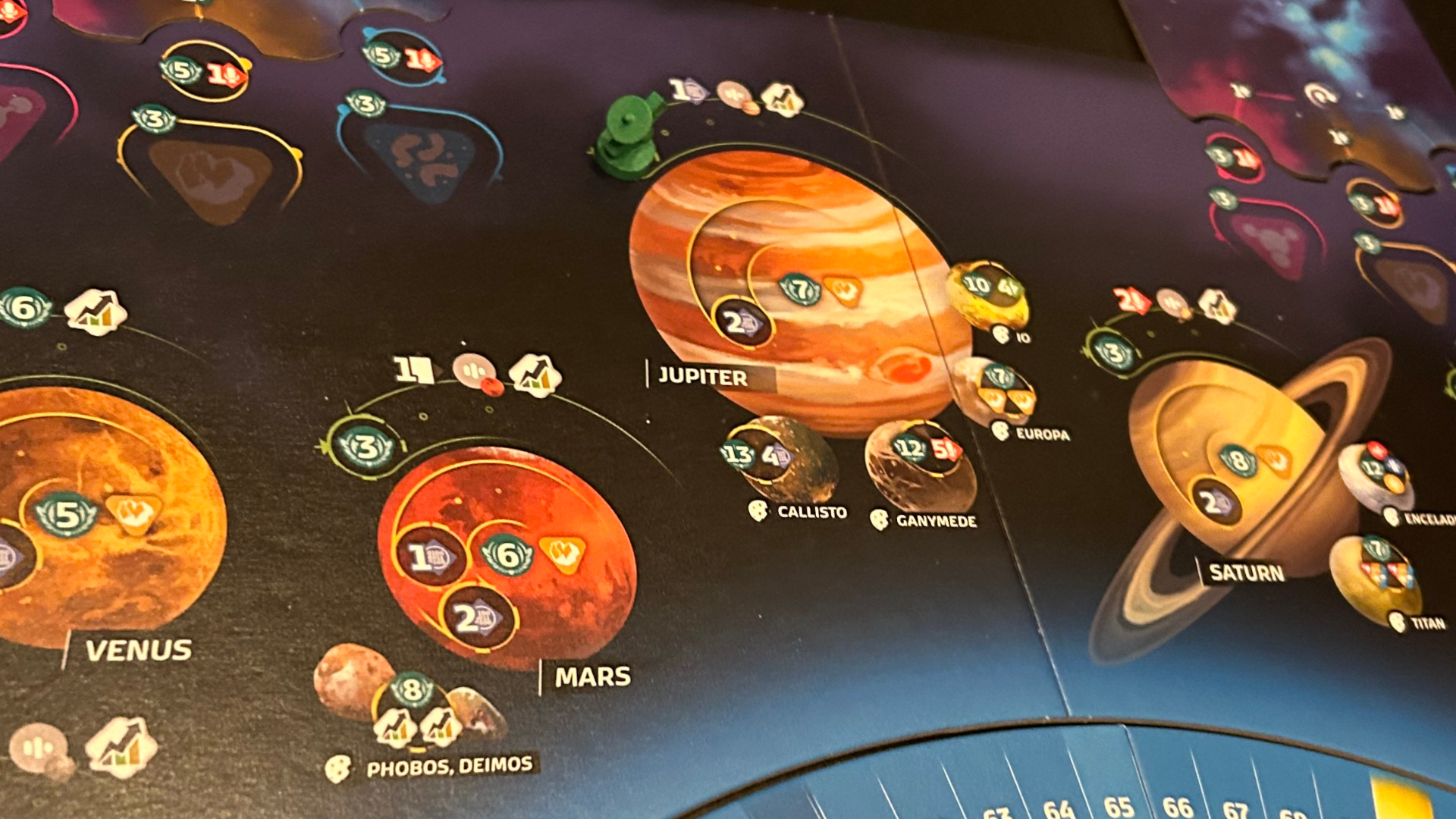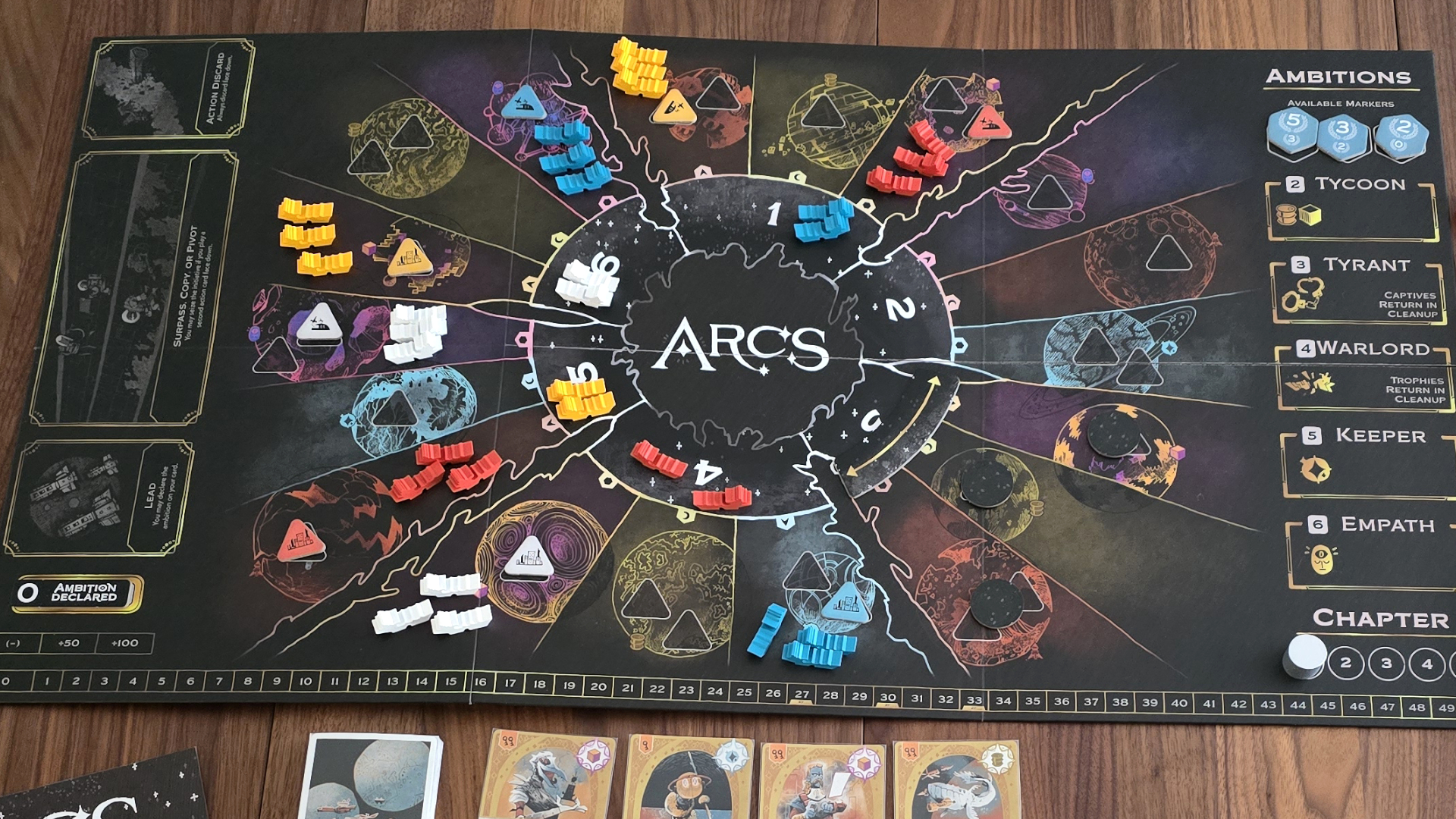GamesRadar+ Verdict
Tomáš Holek’s SETI is an excellent board game for science fiction fans, drawing on real astroscience while imagining some of the alien species that could be lurking out there waiting to be discovered. It may be overly long for some players, particularly when playing with a full table, but it offers a rich complexity as gamers will need to devise winning strategies based on the cards they get and the aliens they encounter.
Pros
- +
Huge variety of cards based on real space programs and technological innovations
- +
Highly interactive solo mode that scales in difficulty as you play
- +
Strategies need to change based on the aliens and number of players
- +
Simulates the revolution of the Solar System
Cons
- -
Very long, especially with four players
- -
Lack of comeback mechanics can be frustrating
Why you can trust GamesRadar+
Humans have been searching for signs of extraterrestrial life for more than a century, funding international efforts to search for signals from distant planets, launch probes, and build bigger and better telescopes. Tomáš Holek’s SETI makes that quest competitive by having players take on the role of rival agencies trying to wisely spend their resources in order to learn the most about the universe.
Like actual space research, SETI is complex and time consuming. Even with player guides for everyone that explain the various actions you can take, how technology upgrades work, and what the end-of-game scoring tiles mean, it’s easy to make mistakes on a first playthrough. It’s more satisfying on a second or third attempt, though even then it’s going to require several hours of commitment since even setting up the board involves a fair amount of work.
If that doesn’t deter you, SETI is a deeply rewarding play experience that forces you to think strategically and take into account what other players are working on and how the moving of the Solar System will impact your future actions. It also has one of the best solo modes I’ve seen in a competitive game, using an evolving deck to replicate the feeling of your opponent’s engine ramping up as the game progresses. If you value head-to-head tactics, this may just be one of the best board games in recent years.
Features & design
Price | $69.99 / £60 |
Ages | 14+ |
Game type | Engine-building / Eurogame |
Players | 1 - 4 |
Lasts | 40mins+ |
Complexity | High |
Designers | Tomáš Holek |
Publisher | Czech Games |
Play if you enjoy | Galileo Galilei, Kutna Hora: The City of Silver, astronomy |
- About searching for intelligent alien life
- Solar system board looks amazing but takes up lots of space
- Five different aliens to encounter, with two chosen secretly each game
- Cards all have flavor text to teach a bit about astronomy
SETI is a table-hungry game, centering on a spectacular modular game board that replicates the Solar System. You can scan a QR code in the rulebook to get a random starting orientation when setting up for each game, which will determine trajectories for your exploration of different planets. The positions will shift regularly, with three different tracks representing the planets, comets and asteroids revolving around the sun.
The other highlight is the large deck of cards which can be played for a wide variety of effects, spent for immediate benefits like earning publicity or moving a probe, or turned into income that you’ll generate each of the game’s turns. The cards are based on real innovations or projects like the Herschel Space Observatory and Mariner 10 Mission, complete with high quality art and a bit of flavor text.
Each player has a small board that represents what they can do with their actions, unlocking more options for scanning distant stars, deploying probes, and crunching data as they upgrade their technology. While the types of technology you can unlock is consistent across games, the kicker prizes you get along with your research is determined randomly during setup so the resources you need are likely to impact what you prioritize.

Similarly, the five aliens have their own boards and decks that offer fresh objectives and strategies when revealed, complete with small decks of cards and their own rules sheets.
Weekly digests, tales from the communities you love, and more
Each player board also has a second side representing a level of difficulty for an AI opponent in SETI’s excellent single player mode. Your virtual academic rival has their own deck that upgrades over the course of a game and based on what aliens you encounter, a dynamic that feels richer than the usual way of increasing difficulty in solo play by denying the player resources.
The pieces are equally well designed, from little microphones representing each player’s publicity score to clear data pieces marked with ones and zeros that you collect from scanning.
Gameplay
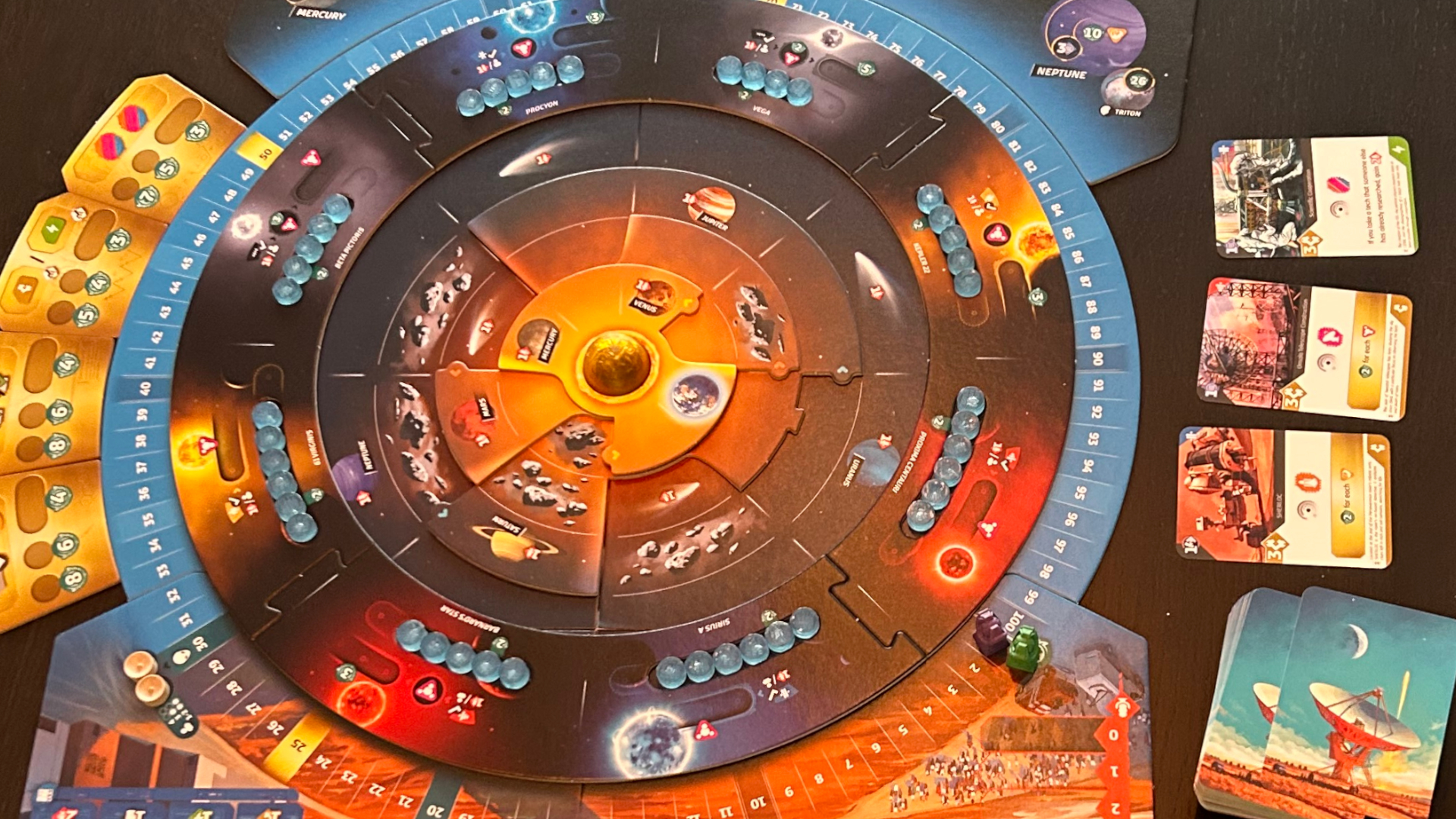
- You need to find your ideal mission window based on Solar System movement
- Actions get more complex and competitive as turns go on
- Be sure to build up a good engine rather than just going for big points
Turns in SETI start relatively fast and simple and ramp up in complexity as players build out their engines, gathering more income that can be used to take more actions. Energy and credits are highly limited resources, with credits mostly being used to play cards while energy allows you to move and land probes. Cards give you a huge amount of options and provide major benefits for completing objectives. They can also significantly add to your score at the end of the game so figuring out what to play when is a huge part of SETI's strategy.
The main way you gain more resources is by increasing your income, which gives you an immediate reward and the same resource again at the start of each of the game’s five turns. In early rounds, players will want to prioritize gathering data and putting probes into orbit to increase their income while earning publicity by flying past planets and comets in order to research new techs that will make their actions more efficient. Unfortunately, if you don’t get a good engine going early in the game, you’re likely to fall behind and have a hard time catching up, which can feel very frustrating given how long SETI takes.
Many researchers can gather data on a given star, but only one researcher actually gets full credit for the discovery. That means you’ll want to plan carefully based on what you think your opponents are going to do and even what position the Earth is likely to be in on future turns when you take your actions in order to make the most out of your research. The relative value of scanning versus landing on planets and moons changes depending on the number of players, with more players meaning additional chances to complete scans and fewer offering less competition for key spots for probes.
When a certain amount of discoveries have been made by crunching data, landing on planets and scanning stars, an alien species is discovered. These aren’t as transformative to the game as you might think, but can favor different strategies. For instance, the insectoid Mascamites encourage players to focus on landing probes on Jupiter and Saturn, while the fossilized remains found on Oumaumua provide another place to scan.
SETI also has one of the best solo modes I’ve seen in a competitive game. The AI starts with a simple four-card deck but replaces cards when the aliens arrive to suit the circumstances and also gains cards that allow them to take more powerful actions over the course of the game. Their difficulty ramps up faster if the player doesn’t complete randomly determined objectives, which are mostly things you probably wanted to try to do anyway, so will shape your priorities. Because so much of the game is based on the location of the Earth and other planets in the Solar System, the AI’s actions never seem too random and you might even get help from them completing scans.
Should you buy SETI?
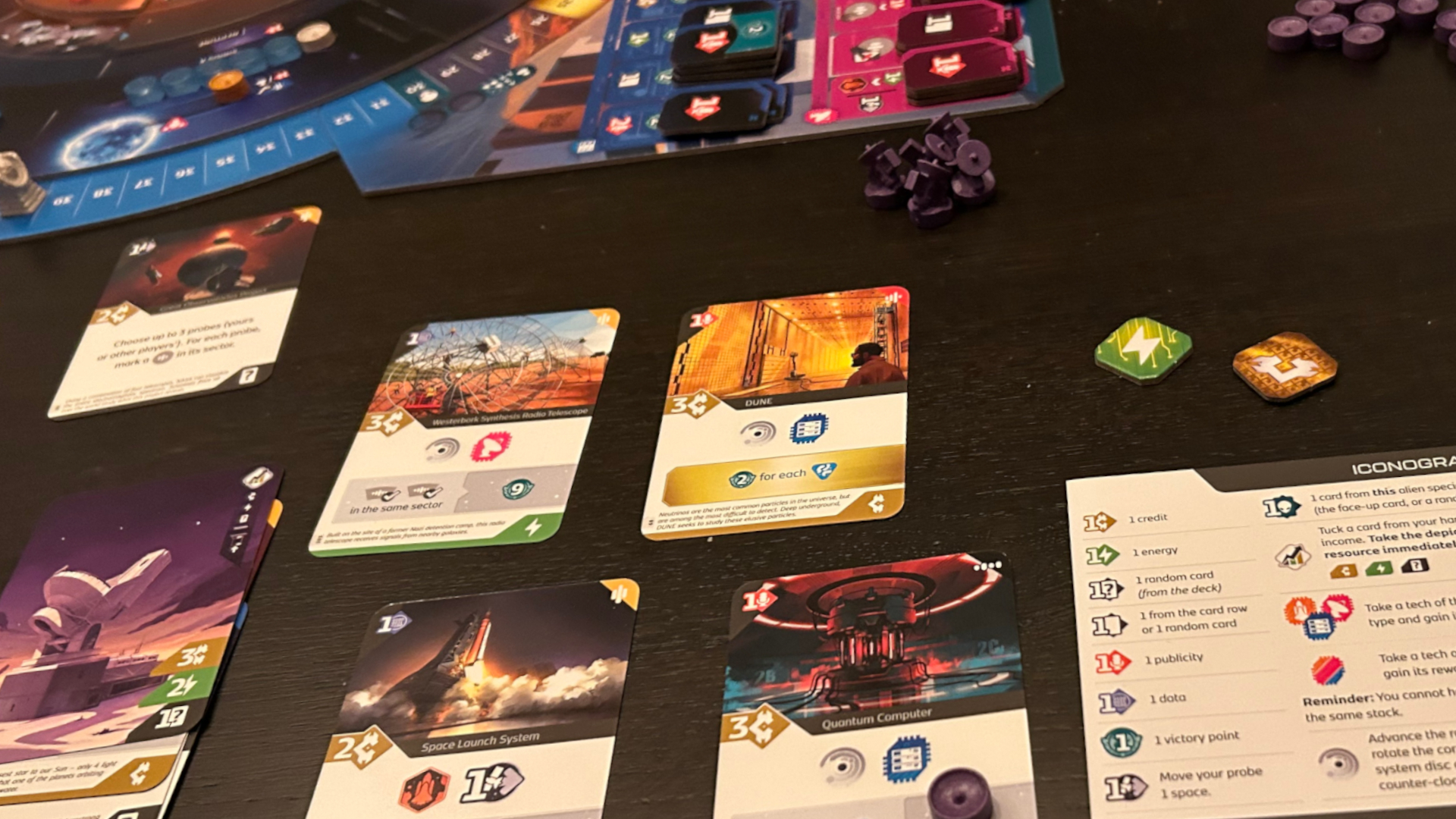
If you find playing highly complex strategic games by yourself or with a small, dedicated group of friends satisfying, SETI would be a great option to add to your collection. It’s especially appealing to fans of astronomy and space faring science fiction, providing rich flavor to compliment the strong design.
Ratings
Category | Notes | Score |
|---|---|---|
Game mechanics | Gradually increasing complexity and the ability to craft deeply satisfying strategies results in a compelling loop. | 5/5 |
Accessibility | This is a 'crunchy' game that requires practice with a relatively high-brow theme, so it'll appeal most to dedicated board gamers. | 3/5 |
Replayability | There's so much to see and do here, and that'll change depending on who - and how many people - you're playing with. | 5/5 |
Setup & pack down | This is a table-hungry game with many pieces to wrangle. | 3/5 |
Component quality | SETI is an absolutely gorgeous game. | 5/5 |
Buy it if...
✅ You like games that require intense focus
SETI isn’t an easy game to learn or master, but figuring out winning strategies for exploring the Solar System is deeply satisfying.
✅ You’re interested in astronomy
The board makes it feel like you’re actually a scientist figuring out the best launch window and trajectory to get probes across space, and the flavor text on cards will teach you a few things.
Don't buy it if...
❌ You prefer shorter games
SETI takes a long time to set up and play, which can be particularly frustrating if you fall behind early in the game.
❌ You don’t have a lot of space for playing games
SETI’s board looks incredible but it takes up a decent amount of room, so you’re going to need a sizeable table to fit it along with the individual player boards.
How we tested SETI
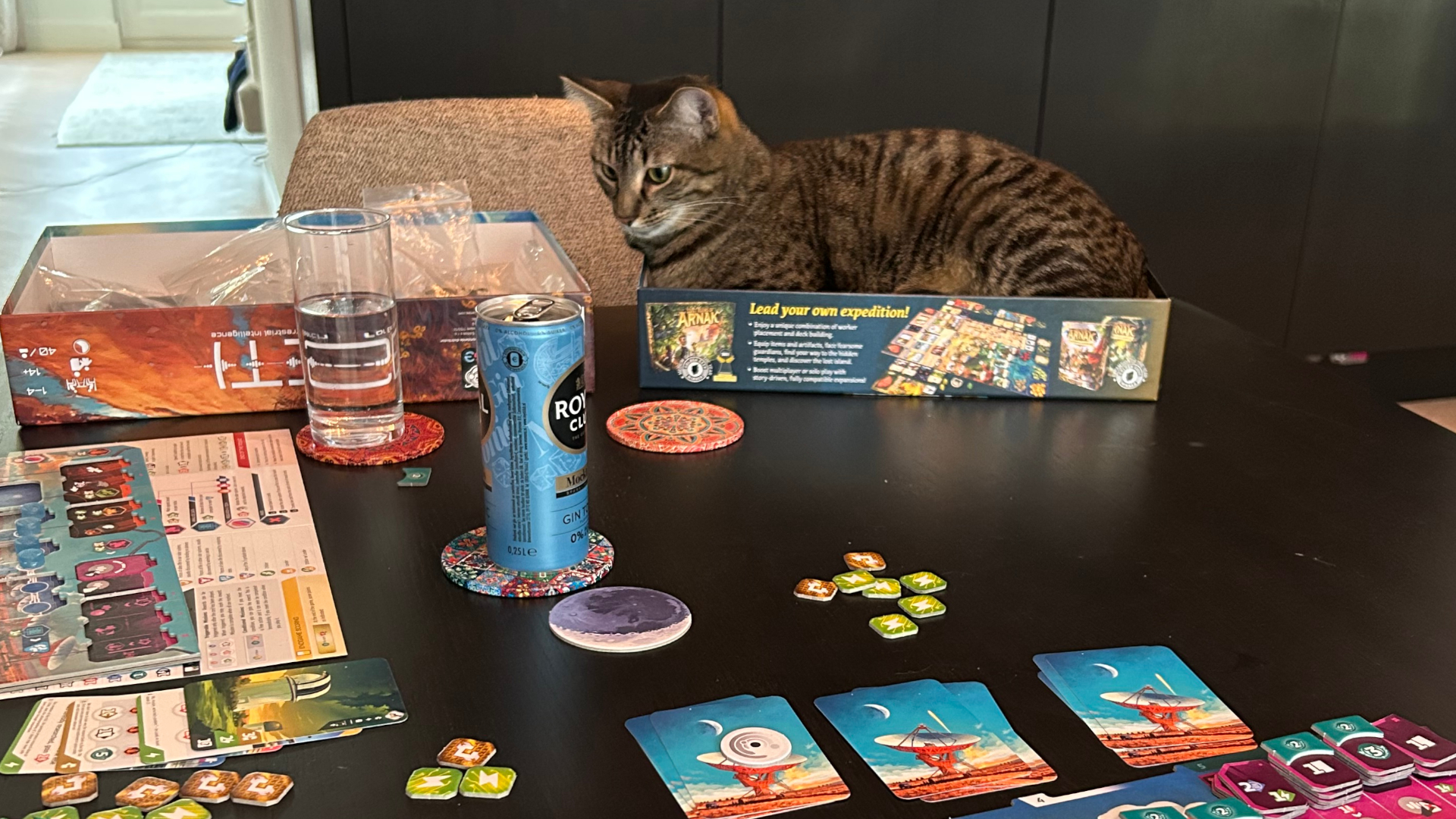
This product sample was provided by the publisher.
Our reviewer played SETI multiple times and with different player counts (including by themselves) over a number of days to get the best sense of the game's systems.
To learn more, be sure to check out this guide to how we test board games. As for a broader overview, see the GamesRadar+ review policy.
For more recommendations, be sure to check in with our guide to the best 2-player board games and the best cooperative board games.

Samantha is a freelance writer that specializes in tabletop gaming. Her credits include Dicebreaker, IGN, Polygon, and The A.V. Club.
